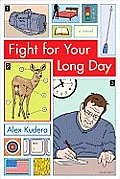- About
- Programs
- Issues
- Academic Freedom
- Political Attacks on Higher Education
- Resources on Collective Bargaining
- Shared Governance
- Campus Protests
- Faculty Compensation
- Racial Justice
- Diversity in Higher Ed
- Financial Crisis
- Privatization and OPMs
- Contingent Faculty Positions
- Tenure
- Workplace Issues
- Gender and Sexuality in Higher Ed
- Targeted Harassment
- Intellectual Property & Copyright
- Civility
- The Family and Medical Leave Act
- Pregnancy in the Academy
- Publications
- Data
- News
- Membership
- Chapters
A Novel Departure
Fight for Your Long Day: A Novel. Alex Kudera. Kensington, MD: Atticus, 2010.
I laughed at parts of Fight for Your Long Day, a new novel by Alex Kudera. At other parts of the novel, I felt inspired. But most of all, Fight for Your Long Day made me sad. Part of my sadness came because Kudera writes elegantly and has created an insightful, tragic, sometimes comic protagonist (I dare not call him a hero) named Cyrus Duffleman, whom the narrator calls “Duffy.” He reminds me of Hamlet—a bit of an introverted whiner, but the kind you love to hear whine. I’m sad when Duffleman is sad. I’m even sadder when he has bits of hope, like when there’s the prospect of an affair with an attractive student, because I know it won’t work out for him. As with any other effective tragic character, there’s something satisfying in watching his tragedy unfold.
The bulk of my sadness comes from my ability to relate to Duffleman. As I write this, I am a full-time nontenure- track instructor in Virginia. I teach four first-year writing courses at James Madison University and one composition course at Blue Ridge Community College. I supplement my teaching income with freelance writing and editing. Fight for Your Long Day is set in Philadelphia, and Duffleman, like me, is a contingent instructor (I dare not call him a professor). He, too, teaches at multiple colleges and universities. He supplements his teaching income with a tutoring job at the corporatized University of America and with shift work as a security guard at another college.
Duffleman often struggles to make it to class on time because he has to rely on public transportation or walk. Only brief moments of the novel are set in the classroom. The few classroom moments we do see are filled with all manner of students who don’t recognize Duffleman as a bottom-rung, shift-work employee. It’s no wonder. In the classroom scenes, we see Duffleman as a knowledgeable, caring instructor, though his mind does tend to wander as students talk; he thinks about catching the train or paying the rent or how he’s going to help a troubled student, all without focusing as much as he should on lectures and discussions.
Most of Duffleman’s students think highly of him. A few even throw him a little birthday bash during his security shift, though this sets up a tragic scene in the novel. Even if the novel spends little time in the classroom—a fitting metaphor for Duffleman’s situation, I think—we realize Duffleman’s students are always there, somewhere, around a corner maybe, protesting at a local rally, or just in Duffleman’s mind as he walks and rides the train and walks some more.
Duffleman is concerned about how administrators perceive him, so he thinks a lot about how to avoid them. In the few interactions Duffleman has with those above him on the institutional ladder, readers, at least, realize that these people he tries so hard to avoid don’t care much about him at all, so long as he doesn’t get sued. In one scene, Duffleman discusses with his department chair a troubled and troubling female student who had cried rape and made racist remarks. Duffleman had tried to lead the student to on-campus counseling, and she had refused. He worries that this student will harm his ability to teach the class. His department dean, Seward, says he can call the cops if she gets violent. She hasn’t been violent, just very disruptive, so Duffleman is in a quandary. “Seward has all the answers,” the narrator tells us, “but Duffy, slow learner, is catching on. Unless he calls the cops on the girl, he’s stuck with her in class. Her rantings were so disturbing that he feels immediate dread at the prospect that she would stay and continue to participate in this way. He isn’t paid enough for such hassle and pain. But before he gets visibly angry and verbally abusive, he remembers his top priority is to appear as if he can handle the situation.”
Duffleman is figuratively lost. He wants to read and write and teach. He wants to be “scholarly,” but when is he supposed to do that with no time (especially on Thursday, his long day), and how is he supposed to do that with no money? All he has time to do is teach and run himself ragged. When Duffleman is ecstatic over ten minutes of free time in a train station (which he uses to get a cup of coffee and catch up on grading papers); when he wants so desperately to help his students learn, despite a hierarchical system that doesn’t allow him to advance in pay or status; when he realizes that he is largely to blame for his career position—these are my moments.
I’m not as downtrodden as Duffleman. I like most aspects of my life, my jobs included, my family especially. A family probably also gives me even more obligations than Duffleman. The thing about Duffleman and me is that we’re up against seemingly insurmountable odds to work in and for (I dare not say against) the businesslike structure of academe. And we have been charged with inspiring and enlightening young minds all the while.
Duffleman’s (and Kudera’s) insights are profound at times, as in the description of his camaraderie with his fellow security guards: “They were lost in the funhouse of capitalism’s creative destruction in an economy so elastic it could expand with the optimism of a televised blimp floating above corporate-sponsored stadiums and then contract like Saran Wrap to the size of a man’s genitals and squeeze out the last productive drop.” But it is Duffleman’s hope in the face of adversity that is inspiring to a fellow contingent faculty member. I am better for reading it.
Then there’s the ambiguous ending.
I can’t reveal the ending, of course, but taken one way, it’s a metaphor for the institutionalized structure of the academy, which shoots down student progress. Taken another way, it reveals how students can get what they want or need out of academe, as long as they don’t rely on the help of contingent faculty members. Yet another interpretation reveals that people like Duffleman, nontenure- track instructors with little more than student progress as incentive, people who recognize their lowly positions and keep on trucking, are the ones who can save higher education from itself, if only others would realize this, too. Maybe your interpretation is different from these or an amalgamation of them all. I guess this is the beauty and pain of an ambiguous ending.
I want to change the situation in which many contingent faculty members find themselves. I aid this change the best way I can, by writing. I started this review by saying that the novel made me sad. After reading the novel, I’m sad also because relatively few of us are doing more than complaining to air. Cyrus Duffleman and Fight for Your Long Day cast light on this situation. I hope the novel is popular enough to make a big change; it has already changed me.
Isaac Sweeney is a writer who spent three years as a full-time non-tenure-track instructor. James Madison University did not renew his appointment for the spring 2011 semester. His essays about the profession have appeared in the Chronicle of Higher Education and Inside Higher Ed. His e-mail address is [email protected].






